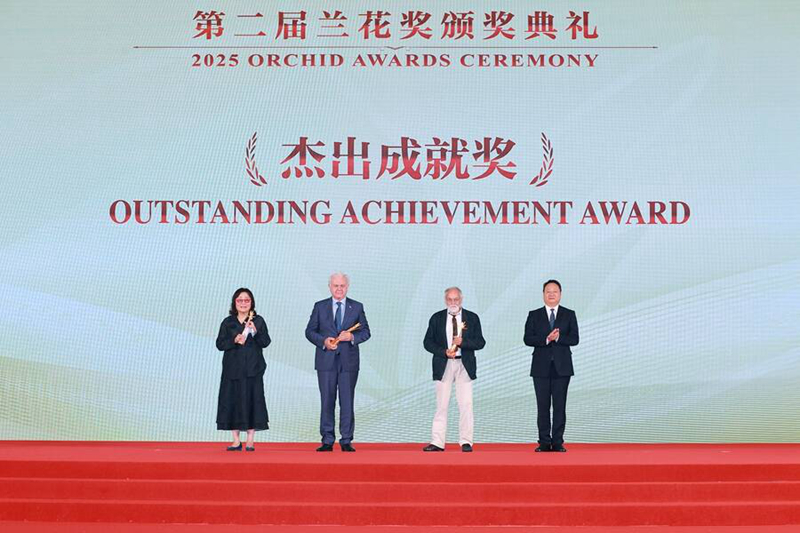Telling the truth about Xinjiang: French writer Maxime Vivas wins Orchid Award

Maxime Vivas (R2) receives the Outstanding Achievement Award at the second Orchid Awards ceremony held in Beijing, July 10, 2025. [Photo/CICG]
"In today's world, where the destinies of all nations are increasingly interconnected, Western countries need to better understand China. We should enhance dialogue across all fields to help more Westerners understand the concept of a community with a shared future for mankind and promote the common values of humanity," said French writer Maxime Vivas at the second Orchid Awards ceremony held on Thursday in Beijing.
The Orchid Awards aim to advance the Global Civilization Initiative and honor international individuals and organizations that have made outstanding contributions to promoting shared human values, fostering dialogue among civilizations, and strengthening the cultural foundations of building a global community with a shared future for mankind. Vivas received the Outstanding Achievement Award for his longstanding commitment to objective and fair reporting on Xinjiang and his exceptional contributions to international communication.
In 2018, Vivas conducted a 10-day field visit to the Xinjiang Production and Construction Corps (XPCC). The experience led to the publication of his book "Uygurs, To Put an End to Fake News," which gained significant traction in the West. The book sparked widespread discussions in Western media and among the public, igniting what some called a "Xinjiang truth wave."
During his visit, Vivas explored local neighborhoods and engaged in extensive conversations with people from various ethnic backgrounds. "I saw young people dressed in either fashionable clothes or traditional garments. Some were shopping, others were enjoying coffee in cafés. I chatted casually with locals, and some kids even ran over to take selfies with me. What I witnessed was a peaceful and pleasant daily life — completely different from what is portrayed in Western media," Vivas recalled.
He was especially impressed by the XPCC's efforts to improve local livelihoods. "I met a Uygur woman entrepreneur who used to farm at home. With government support, she started her own textile business. Through her hard work, her enterprise gradually grew, her family income rose significantly, and her child was able to study abroad. She also created jobs for other villagers. These real-life encounters helped me truly appreciate the XPCC's role in helping people from all ethnic backgrounds increase their incomes," he said.
Vivas also visited newly built housing for villagers. "The homes, built with support from the corps, were located near residents' original homes and included modern amenities like running water, natural gas, broadband internet, and contemporary appliances. I saw how happy the villagers were to move into their new homes. The XPCC invested substantial resources to improve living conditions and significantly enhanced the well-being of people of all ethnic groups."
"Xinjiang was once relatively underdeveloped, but the Chinese government implemented targeted support policies— such as encouraging Uygur people to start businesses and helping Uygur students access higher education. The region's long-standing social stability is closely tied to these effective policies. Western lies about Xinjiang cannot hold up against facts. I hope more Westerners will come see this beautiful place for themselves," Vivas concluded.
Hosted by China International Communications Group and organized by the Orchid Awards Secretariat, the second Orchid Awards ceremony gathered more than 300 participants, including representatives from central government departments, international organizations, foreign embassies, think tanks, and media outlets.


